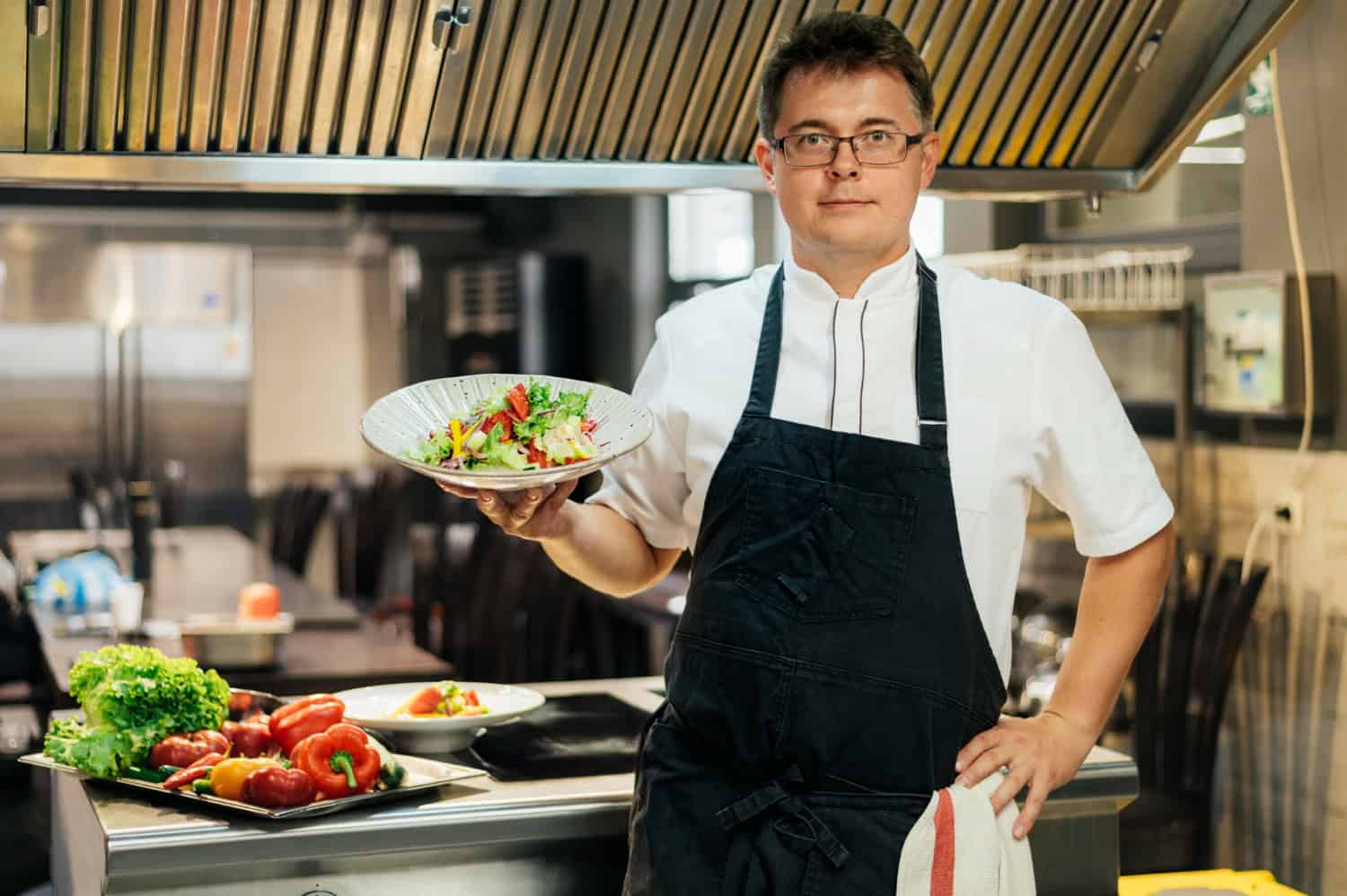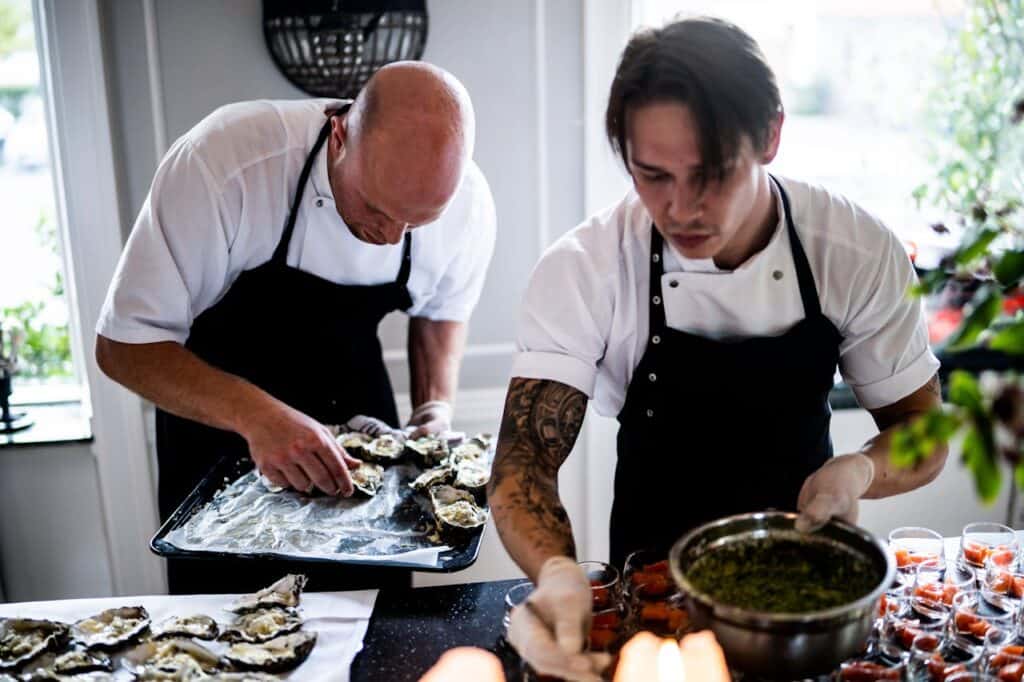
By Jermaine Thomas February 21, 2025
The catering sector is a dynamic and challenging arena that demands commitment, innovation, and outstanding organizational abilities. A professional caterer’s daily tasks encompass far more than merely making tasty food—it involves careful planning, coordination, and tackling various catering obstacles. This article provides a comprehensive insight into the behind-the-scenes efforts required to manage a thriving catering business and ensure excellence for each client.
Early Morning: Planning and Preparation
The early morning hours set the tone for the entire day in the catering industry. Whether handling a small gathering or a large-scale event, professional caterers must begin their day with thorough planning and organization. Each day brings unique challenges, making it essential to stay ahead with strategic preparation and coordination.
Reviewing the Day’s Schedule
A professional caterer’s day starts early, often before sunrise. The first order of business is to review the day’s events. Whether it’s a corporate luncheon, a wedding reception, or a private dinner party, each event has unique requirements that must be meticulously planned. This involves going through client notes, confirming event details, and ensuring all necessary permits and licenses are in place.
Checking Inventory and Ordering Supplies
Before heading to the kitchen, caterers must verify their inventory to ensure they have all the ingredients and equipment needed for the day’s events. If anything is missing, they place last-minute orders with suppliers or visit local markets for fresh ingredients. High-quality ingredients are the backbone of any successful catering service, making this step crucial in food service operations.
Preparing the Kitchen and Staff
After the inventory is checked, the kitchen needs to be prepared. This involves cleaning surfaces, arranging tools, and informing the kitchen team about the menu and particular client preferences. Collaboration with chefs, waitstaff, and delivery staff guarantees that everyone is aligned prior to starting the cooking process.

Mid-Morning: Cooking and Food Preparation
The transition from preparation to execution marks one of the most intense parts of a caterer’s day. As the kitchen starts buzzing with activity, precision, speed, and efficiency take center stage. Every dish must be crafted to meet client expectations, and there is no room for errors when serving large crowds with diverse preferences.
Cooking in Batches for Efficiency
With everything in place, it’s time to start cooking. Large-scale catering requires preparing food in batches while maintaining consistency in taste and presentation. Professional caterers use time-tested techniques and precise measurements to ensure each dish meets high standards.
Handling Special Dietary Requests
Numerous clients ask for personalized menus to meet dietary needs, allergies, or cultural considerations. A skilled caterer needs to be knowledgeable about alternative ingredients and cooking techniques to accommodate vegetarian, vegan, gluten-free, or other specific dietary requirements while maintaining taste.
Managing Time Constraints
One of the biggest catering challenges is working within tight schedules. Dishes must be cooked, packed, and transported at the right time to maintain freshness and quality. Efficient time management and teamwork are essential to meeting these demands.
Afternoon: Logistics and Setup
Logistics and setup play a crucial role in ensuring a seamless catering experience. Every detail, from transportation to final table arrangements, must be meticulously planned and executed to deliver the highest level of service. Caterers must be proactive, anticipating potential challenges to prevent delays or mishaps.
Packing and Transporting Food Safely
Once the food is prepared, it is carefully packed in insulated containers to maintain proper temperatures during transportation. Attention to detail is critical at this stage to prevent spillage, contamination, or temperature fluctuations that could compromise food quality.
Setting Up the Venue
Upon arrival at the event venue, the catering team quickly gets to work setting up buffet tables, plating dishes, arranging cutlery, and ensuring everything is aesthetically pleasing. For sit-down meals, caterers coordinate with event planners to arrange seating and table settings to align with the client’s vision.
Coordinating with Event Staff
Caterers work closely with event coordinators, decorators, and venue managers to ensure smooth service. Clear communication is key to preventing last-minute surprises and ensuring that food service operations run seamlessly.
Evening: Serving and Guest Interaction
As the event progresses, the caterer and their team are completely focused on delivering seamless service and ensuring guest happiness. This stage demands sharp attention to detail, smooth collaboration, and an initiative-driven attitude to tackle any unforeseen challenges. As guests arrive and food service is underway, the team needs to uphold professionalism, guaranteeing that each dish is presented attractively and served at the correct temperature.
Delivering Excellent Customer Service
A great caterer does more than just provide food—they create a memorable dining experience. Whether it’s a formal plated dinner or a buffet-style service, caterers ensure that guests receive warm, prompt, and professional service. Addressing special requests and handling unexpected situations gracefully is part of the job.
Managing Last-Minute Changes
In the catering industry, flexibility is crucial. Guest counts may change, food preferences may shift, or unexpected challenges may arise. Professional caterers must think on their feet and adapt quickly to ensure that everything runs smoothly.
Ensuring Food Safety and Hygiene
Ensuring food is stored at proper temperatures and adhering to hygiene practices, food safety remains a primary focus. Correct handling, storage, and serving techniques help avert foodborne illnesses and guarantee a high level of service.
Late Night: Cleanup and Reflection
As the event winds down, caterers begin the crucial process of wrapping up. This phase is not just about cleaning; it is a time to reflect on the day’s work, gather feedback, and ensure everything is in order for the next event. The efficiency of this stage can impact the overall workflow and readiness for future engagements.
Packing Up and Cleaning
Once the event concludes, the catering team begins the extensive cleanup process. This includes packing leftover food, dismantling buffet setups, cleaning dishes, and ensuring the venue is left spotless. A well-organized cleanup process makes the next day’s preparation smoother.
Evaluating the Event’s Success
Following the cleanup, caterers frequently hold a debriefing meeting to evaluate the event’s success. They talk about what was effective, what needs enhancement, and any input from clients or visitors. This ongoing enhancement strategy aids in optimizing food service processes and upholding high standards.
Preparing for the Next Event
A caterer’s job never truly ends. As one event wraps up, preparations for the next begin. Reviewing upcoming bookings, making ingredient lists, and planning logistics for the next day ensures a seamless workflow.

Challenges Faced by Professional Caterers
Running a catering business is not just about cooking delicious food; it involves handling logistics, client expectations, and unpredictable challenges. From ensuring top-notch food presentation to dealing with unforeseen changes, professional caterers must be prepared for anything to deliver a flawless experience.
Balancing Quality and Quantity
Caterers must strike a balance between maintaining food quality and producing meals in large quantities. This requires careful planning, skilled cooking techniques, and top-tier kitchen management.
Handling Last-Minute Changes
Clients frequently ask for adjustments at the last moment, whether it’s extra attendees, menu changes, or venue modifications. Being flexible and responsive enables caterers to manage these unforeseen changes.
Managing Stress and Long Hours
The catering industry demands long hours, including early mornings, late nights, and weekends. Managing stress, staying physically active, and maintaining a passion for food are essential to thriving in this field.
Conclusion
A typical day for a professional caterer is far from normal. From early morning setups to late-night tidying, each phase demands accuracy, collaboration, and a dedication to quality. Although the role has its difficulties, the pleasure of executing a perfect event and witnessing happy clients makes it entirely rewarding. Behind the scenes, caterers labor diligently to guarantee that every event is a culinary triumph, demonstrating that outstanding food is merely one aspect of a remarkable catering experience.